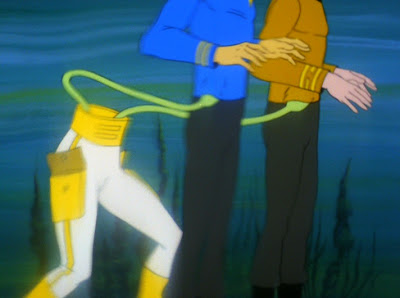STARDATE:
7403.6
The
U.S.S. Enterprise explores a world called Delta Theta III, and discovers that a
race of aboriginal Saurians dwell there.
These aliens are under “Prime
Directive protection” according to Captain Kirk (William Shatner), and this
means any landing parties must explore the world with discretion.
Unfortunately,
a colony creature known as Ai Bn Bem (from the planet Pandro) -- an honorary Starfleet Commander and
independent observer -- demands to be included on the landing party and is “adamant” about his participation. Almost immediately, however, he interferes
with standard operating procedures, fooling with the ship’s transporters and Starfleet
equipment such as the communicators.
The
Enterprise landing party soon learns that the aborigines are protected by a
Mother-like “God” alien, one that doesn’t want anyone to hurt her “children.”
Bem’s
actions, however, threaten that divine edict and the safety of the landing
party…
David
Gerrold’s second contribution to Star Trek: The Animated Series is
brimming with good, inventive ideas, but ultimately they don’t cohere into a
better-than-average installment of the series.
Is “Bem” a wacky comedy, one in which Mr. Spock and Captain Kirk crack-wise
and do pratfalls? Here, they accidentally beam down...into the water, and at one point, Kirk jokes about wishing he were a librarian instead of a Starfleet Captain.
If the episode is supposed to be a comedy, however, Bem's actions are hardly funny. He sabotages Starfleet equipment, constantly puts Starfleet officers in danger, and finally even jeopardizes the normal development of a primitive alien culture. The Prime Directive may be bent, stretched or broken in Star Trek, but it is rarely a laughing matter.
Or, contrarily, is "Bem" a parable
about parenting, right down to its discussion of the merits of discipline and
punishment? I think it actually works better if considered in this light, but again, the comedy shtick seems to work against the narrative and theme.
The answer regarding "Bem's" tone isn’t entirely forthcoming,
and so this episode doesn’t reach the series’ highest tier. This fact established, “Bem” is a veritable
well-spring of ideas, and many of the concepts featured here recur in later franchise
entries, notably The Next Generation’s “Justice” and “Matter of Honor.”
In
the former TNG episode, Captain Picard (Patrick Stewart) and his crew
visit a planet where a God-like being -- in this case a father, not a mother --
protects a race of innocents, not Saurians but “the Edo,” from off-world
interference.
In the latter episode,
the Enterprise plays host to another alien exchange students of sorts, a Benzite
officer who has trouble integrating his behavior with Starfleet protocols and
decorum. “Bem” is pretty clearly an
early version of both of these tales.
Despite
its introduction of these concepts, there’s the unshakable feeling with “Bem”
that everything is just a little off, perhaps the result of a hurried or difficult schedule.
For instance, Shatner’s reading of the Captain’s Log introduction is bizarre to
say the least, almost like he is confused about the details he is relaying. His reading here, in fact, feels totally out-of-step with the Captain’s Log entries of every Animated
Series episode thus far.
Seriously, listen to his line readings and cadences here. What was he thinking?
The
most visually distinctive but also, alas, juvenile concept of “Bem” is the idea
that the alien visitor is a “colony creature.”
This is a concept already utilized by Gerrold on this series, in “More
Tribbles, More Troubles.” There, giant
tribbles weren’t actually giants at all…but colonies of the creatures forming together
as kind of gestalt organisms. Bem is the
same deal all over again, but to see the alien’s body parts fly off, independently of one
another, fails to inspire or awe. Bem seems, in visualization, more like a high-concept gimmick than a legitimate alien life form.
Such
criticism duly noted, I should confess that I've always appreciated “Bem’s” final human and humane point: that capital
punishment isn’t very useful or productive. How can a
victim of such punishment learn from his errors if not granted a second chance? After all, the death penalty doesn't bring anyone back to life. “What
is punishment? Revenge?” asks the gentle God creature (voiced by Nichelle Nichols), and that’s a nice Star
Trek-ian message.
You just know a Saturday morning TV series is operating on a commendable level of complexity if an episode like "Bem" is able to explore so profoundly the line between vengeance and justice. I've always been a big fan of David Gerrold's work (non-fiction, fiction and for television...), and there's a lot to like about "Bem" even if it doesn't entirely come together in the end.
Next
week: “The Practical Joker”













I think the reading of this episode as a parable rather than a comedy is the correct one, certainly seems to me what was intended, and this was the way I took it even as a young child in 74 or 75.
ReplyDeleteThe comedy pratfalls such as the landing in water serve to suggest a child like nature to the visitors that can be played against the evolved intelligence. The moment when BEM suddenly sprouts arms from his torso underater suggests something much more sinister and obvious is going to follow, and the story is commendable for not unfolding into a simple spy/sabotage scenario.
I see next is "The Practical Joker". This is my all time favourite of the animated series, or, dare I say it, any of the franchise.
Of course, this episode does contain one interesting piece of Star Trek lore: it is the origin of Kirk's middle name, Tiberius (later "canonfied" in ST:VI.)
ReplyDeleteAlso, I always thought the title was a pun on B.E.M., even though Bem himself wasn't particularly bug-eyed...
John nice review. Evan as a young boy in '74, the Bem character and episode seemed funny to me.
ReplyDeleteSGB